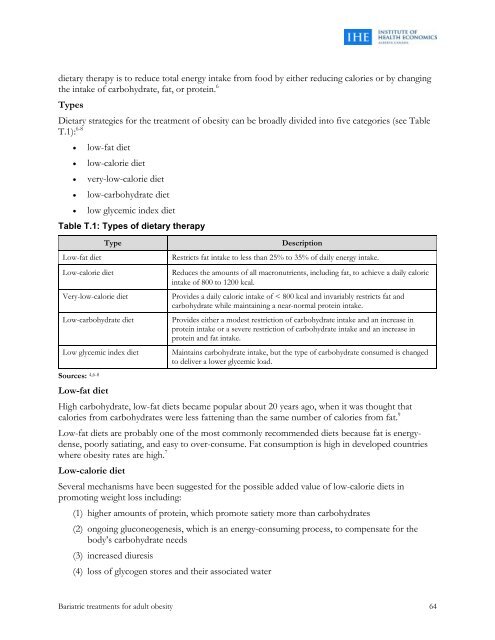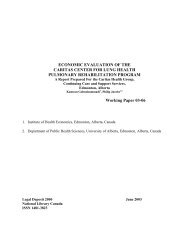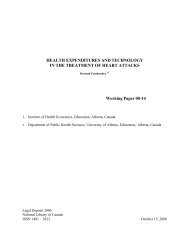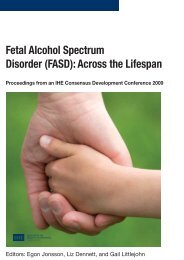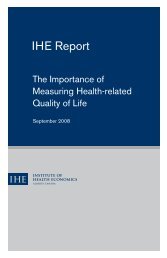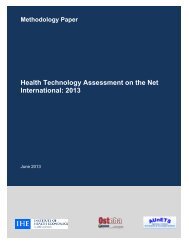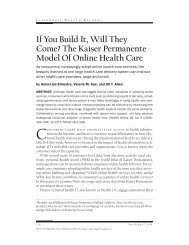- Page 1 and 2:
Alberta STE ReportBariatric treatme
- Page 3 and 4:
Alberta STE ReportBariatric treatme
- Page 5 and 6:
EXECUTIVE SUMMARYSocial and System
- Page 7 and 8:
Three surgical procedures—adjusta
- Page 9:
Costs of Bariatric Surgery and Pote
- Page 12 and 13:
Regulatory status .................
- Page 14 and 15:
TABLES AND FIGURESSection One: Soci
- Page 16 and 17:
ABBREVIATIONSAll abbreviations that
- Page 18 and 19:
LYMmMAMDMUHCNANHLBINHSNICENIHNNHNPH
- Page 20 and 21:
Bariatric physician: a licensed Doc
- Page 22 and 23:
High-density lipoprotein (HDL): a f
- Page 24 and 25:
Very-low-calorie diet (VLCD): a die
- Page 26 and 27:
Additional Internet searches were c
- Page 28 and 29:
This report addresses obesity in ad
- Page 30 and 31:
Many systemic factors have been ide
- Page 32 and 33:
Severe obesity is associated with d
- Page 34 and 35:
eport their height and under-report
- Page 36 and 37:
Also using self-reported data from
- Page 38 and 39: An examination of overall obesity d
- Page 40 and 41: Table S.2 presents the associationa
- Page 42 and 43: • have multiple focal points and
- Page 45 and 46: The main problem in any weight mana
- Page 47: food, and a negative body image. As
- Page 50 and 51: directly causes death. 61 To the ex
- Page 52 and 53: The addition of a selected pharmaco
- Page 54 and 55: lack of formal training in nutritio
- Page 56 and 57: slightly more likely to have prescr
- Page 58 and 59: selection criteria, have facilities
- Page 60 and 61: Barriers to using appropriate baria
- Page 62 and 63: Overview of adult obesityOver the p
- Page 64 and 65: the need for regular physical activ
- Page 66 and 67: phenylpropanolamine/25. Sibutramine
- Page 68 and 69: Complianceand AdherenceDemand andut
- Page 70 and 71: Aetna Clinical PolicyBulletinswww.a
- Page 72 and 73: Overweight 123,821 172,971 157,623
- Page 74 and 75: REFERENCES1. 2006 Canadian clinical
- Page 76 and 77: 34. Gostin LO. Fast and supersized:
- Page 78 and 79: 69. Klarenbach S, Padwal R, Wiebe N
- Page 80 and 81: 105. Hill JO, Thompson H, Wyatt H.
- Page 82 and 83: 141. Ross R, Bradshaw AJ. The futur
- Page 84 and 85: 172. Arkinson J, Ji H, Fallah S, Pe
- Page 86 and 87: This section will address a set of
- Page 90 and 91: Additional benefits of exercise ove
- Page 92 and 93: medications that inhibit intestinal
- Page 94 and 95: Rimonabant may be considered for pa
- Page 96 and 97: Long-term complications are specifi
- Page 98 and 99: Devices used for bariatric surgeryH
- Page 100 and 101: Description of the Included Systema
- Page 102 and 103: AEs for sibutramineAs compared to a
- Page 104 and 105: Evidence on Efficacy/EffectivenessW
- Page 106 and 107: Table T.7: Effects of behavioural t
- Page 108 and 109: SurgeryDescription of the included
- Page 110 and 111: follow-up time was 3 years. Results
- Page 112 and 113: group as compared to the VBG group.
- Page 114 and 115: The authors identified many methodo
- Page 116 and 117: The investigators pointed out that
- Page 118 and 119: approximately 3 to 5 kilograms. For
- Page 120 and 121: for studies with a mean age of part
- Page 122 and 123: Examining whether use of any of the
- Page 124 and 125: Evidence from placebo-controlled cl
- Page 126 and 127: colorectal or gastroesophageal or f
- Page 128 and 129: Web of ScienceISI Interface License
- Page 130 and 131: AMA Clinical PracticeGuidelineswww.
- Page 132 and 133: critical appraisal of the included
- Page 134 and 135: APPENDIX T.B: EXCLUDED STUDIESTable
- Page 136 and 137: Padwal R, Li SK, Lau DC. Long-term
- Page 138 and 139:
Quality subsection 1: At least MEDL
- Page 140 and 141:
Quality subsection 5a:Study quality
- Page 142 and 143:
Partially reported: The study types
- Page 144 and 145:
Table T.C.1: Results of quality ass
- Page 146 and 147:
Table T.C.1: Results of quality ass
- Page 148 and 149:
APPENDIX T.D: CHARACTERISTICS OF SY
- Page 150 and 151:
Table T.D.1: Characteristics of the
- Page 152 and 153:
Table T.D.1: Characteristics of the
- Page 154 and 155:
Table T.D.2: Characteristics of the
- Page 156 and 157:
APPENDIX T.E: EVIDENCE TABLE ON SAF
- Page 158 and 159:
Serious surgical complicationsSurgi
- Page 160 and 161:
LSGmMAMDNAnssORQoLRCTRDRRRYGBSBPTGV
- Page 162 and 163:
Table T.F.1-2: Weight loss - Behavi
- Page 164 and 165:
Table T.F.1-4: Weight loss - Surger
- Page 166 and 167:
Table T.F.2: Quality of life (QoL)
- Page 168 and 169:
Curioni & Lourenco 2005 58Cholester
- Page 170 and 171:
Table T.F.3-3: Risk factors/comorbi
- Page 172 and 173:
Table T.F.3-5: Long-term effects of
- Page 174 and 175:
Maciejewski et al., 2005 65Avenell
- Page 176 and 177:
Table T.G.2: Effects of bariatric s
- Page 178 and 179:
Table T.G.4: Effects of bariatric s
- Page 180 and 181:
18. Cerulli J, Lomaestro BM, Malone
- Page 182 and 183:
50. Health Canada Drug Product Data
- Page 184 and 185:
SECTION THREE: ECONOMIC EVALUATIONC
- Page 186 and 187:
Definition of bariatric surgical pa
- Page 188 and 189:
etween surgical interventions, the
- Page 190 and 191:
concluded that adding orlistat to L
- Page 192 and 193:
Weight management program (WMP) ver
- Page 194 and 195:
groups. Compared with standard care
- Page 196 and 197:
Results from Analysis of Provincial
- Page 198 and 199:
DiscussionThe objectives of the eco
- Page 200 and 201:
surgical suites, and so on. The bud
- Page 202 and 203:
APPENDIX E.A: LITERATURE SEARCH SUM
- Page 204 and 205:
CRD Databases(DARE, HTA & NHS EED)h
- Page 206 and 207:
Web of ScienceISI Interface License
- Page 208 and 209:
NEOS Librarywww.library.ualberta.ca
- Page 210 and 211:
Table E.A.2: Evidence table of revi
- Page 212 and 213:
ResultHealth outcomesCostsMarginal
- Page 214 and 215:
CostsMarginal analysisThe cost anal
- Page 216 and 217:
Time Horizon/discount rateCurrency/
- Page 218 and 219:
Objectivestudy perspective: society
- Page 220 and 221:
ResultHealth outcomesCostsMarginal
- Page 222 and 223:
ResultHealth outcomesCostsMarginal
- Page 224 and 225:
S4Economic burden of obesityMean co
- Page 226 and 227:
15. Lacey LA, Wolf A, O'shea D, Ern
- Page 228 and 229:
Author Contribution StatementsPaula


